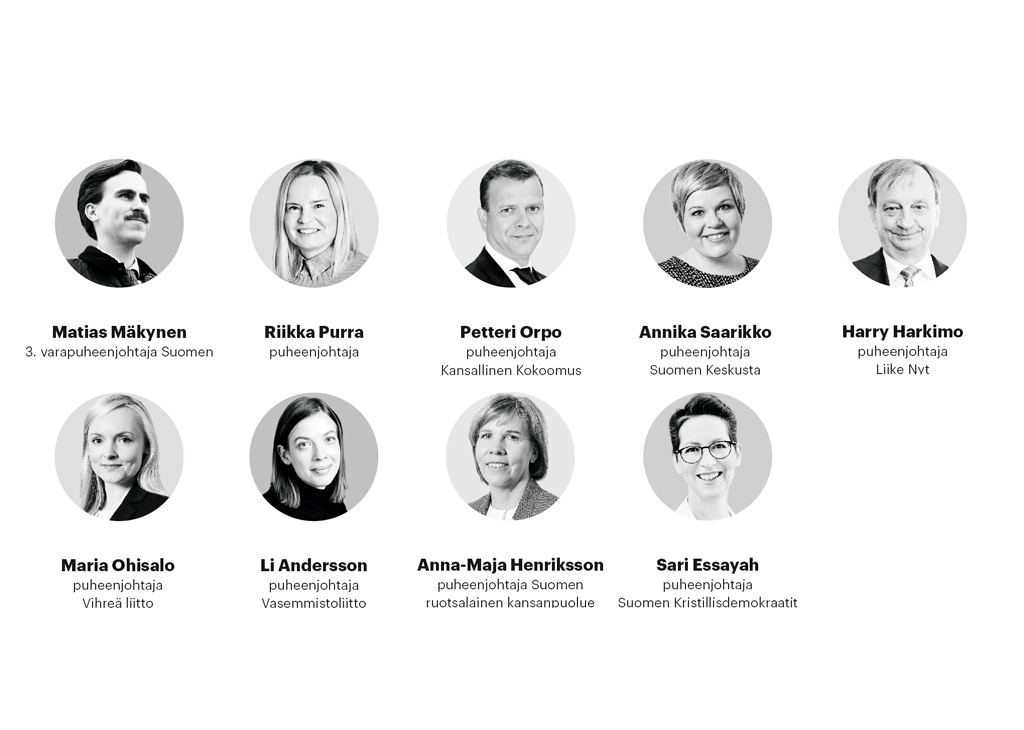
What kind of science policy do you expect from the government?
We asked the parliamentary parties their opinions on the science policy required from the next government.
Text juha merimaa Images samuli skuntsi, jonne räsänen, pekka mustonen, kimmo brandt, Pekka nieminen Translation Marko saajanaho

Matias Mäkynen, 3rd Deputy Chair, Social Democratic Party of Finland
”It is not the job of politicians to decide what is researched in Finland. The focus points of the Research, Development, and Innovation policy (RDI) should be decided through extensive and open cooperation with the policymakers, the academic world, and the business sector.
The structure of higher education deserves a critical look, but any change must be carefully considered. Our strong universities and extensive network of universities of applied science support the educational goal of reaching 60 percent of people with higher education in young age groups by the 2030s. Increasing RDI funding to four percent of the National Gross Profit (NGP) is essential. Growing investments also require more experts.”
Riikka Purra, Leader, Finns Party
”I tend to shun research being politically guided. Instead, the government should absolutely encourage the university institution itself to uphold academic ideals, oversee scientific criteria, and question power. When it comes to the higher education field and multidisciplinary universities, I would consider how to bring them into closer interaction with their operating environment and how to facilitate the universities profiling themselves towards their own strengths. Of course, this is also a question of financing.
The goal to increase research expenditure to four percent is welcome, but very difficult. It can only be accomplished by redirecting resources from somewhere else. In addition, the universities’ capability to obtain additional funding should be developed and supported.”
Petteri Orpo, Chairman, National Coalition
”The next government must carry out a goal-oriented science policy. The Coalition is committed to the Vision for Higher Education and Research goals. RDI funding must be increased to four percent of the NGP.
The Coalition is committed to increase the number of highly educated young adults to 50 percent of their age group. This means increasing study places and ensuring degree completion. Public policy supports the creation of research and expertise centres through stable and predictable research funding and the continuation of the Lippulaiva work for research. Scientific integrity and higher education institutions’ ability to research and create are protected by ensuring a sufficient level of core financing.”
Annika Saarikko, Leader, Centre Party of Finland
”The Centre Party believes in free science and research. Obviously, certain points of emphasis are created through various priority projects and related research funding. During this term, the Centre Party has led efforts to ensure strong higher education throughout the country. In the future, every region should have at least one higher education institution.
The institutions themselves may determine their development directions.
The Coalition is committed to four-percent RDI funding. This is an ambitious goal, especially considering the current financial outlook. With careful direction and on a longer-term basis, these investments will bring growth and invigorate areas as well. Building a balanced financial package requires academia to get its share of the growth.”
Maria Ohisalo, Chairperson, Green League
”In university terms, a quarter is not a quarter year but a quarter century.
Directing research and higher education towards short-term financial or political interests does not support the autonomy of higher education or freedom of science. This short-sighted funding race has harmed the ability to focus on long-term scientific work, especially core research.
It is time to genuinely invest in core financing, research, and teaching, or in other words, go back to basics. The share of research expenditure must be increased to four percent by 2030. Higher education study places must be increased, and international mobility improved. This is how we can achieve a flourishing cycle of knowledge and creation.”
“It is time to genuinely invest in core financing, research, and teaching, or in other words, go back to basics.”
Maria Ohisalo, Green League
Li Andersson, Chairperson, Left Alliance
”Freedom of science is a major part of a democratic society. There is a great risk of core research not being emphasised enough if research is politically guided. Public research funding should emphasise the core financing of our higher education institutions. Tendered and guided funding should only supplement this.
The most essential areas of development are increasing the level of funding and improving university democracy. The goal to increase research funding to four percent is not only realistic but vital. One of the most important questions of the near future is how investments are allocated for RDI activities. We in the Left Alliance want core research and education at the centre of investments growing long-term.”
Anna-Maja Henriksson, Leader, Swedish People’s Party of Finland
”Political guidance does not create innovation. Bringing experts from different fields together does. However, sometimes it might be appropriate for the government to highlight areas of research that are important for social development at the moment.
Cooperation between higher education institutions should be encouraged. We need more cooperation between business, academia, and startup environments.
Increasing RDI investments to four percent of the NGP is an important goal. The public part of this should be at least 1.3 percent. Private RDI funding should be encouraged through tax incentives, for example, and private and business donations to the universities should be tax deductible.”
Sari Essayah, Leader, Christian Democrats
”Our universities and universities of applied science are capable of bringing many types of growth to Finland, as long as the needs of both core research and research, development, and innovation activities are addressed. The goal to increase research expenditure to four percent by 2030 is challenging especially in terms of direct public RDI investment and benefits, but it can also be promoted in ways that encourage RDI activity in the private sector, such as RDI tax deductions.
The organisation of the higher education field is quite good. We support the retention of the current decentralised higher education network. University autonomy must be retained – it is not the job of the government and politicians to guide research towards certain priorities.”
“It is not the job of the government and politicians to guide research towards certain priorities.”
Sari Essayah, Leader, Christian Democrats
Harry Harkimo, Chairperson, Movement Now
”In a situation with a budget deficit and a need for prioritisation, the government should guide research priorities in such a way that the research meets the needs. We need more cooperation between businesses and higher education institutions.
Research funds must be invested in the green transition and digitalisation. However, needless guidance of research should be avoided in order to retain academic freedom.
The goal to increase research, development, and innovation funding to four percent of the NGP is difficult in the current financial climate, but I feel it is important for this to be achieved. We need researched knowledge to ensure Finland remains competitive. It is also important for Finnish higher education to remain valued internationally, and this is where research plays a big role.”

